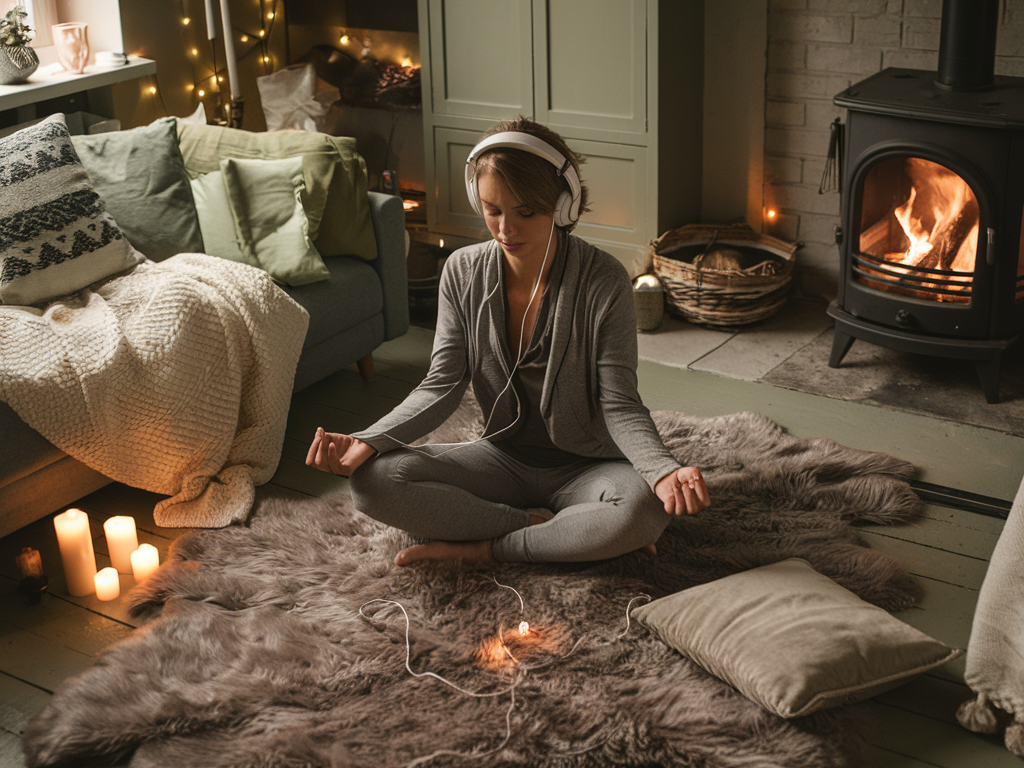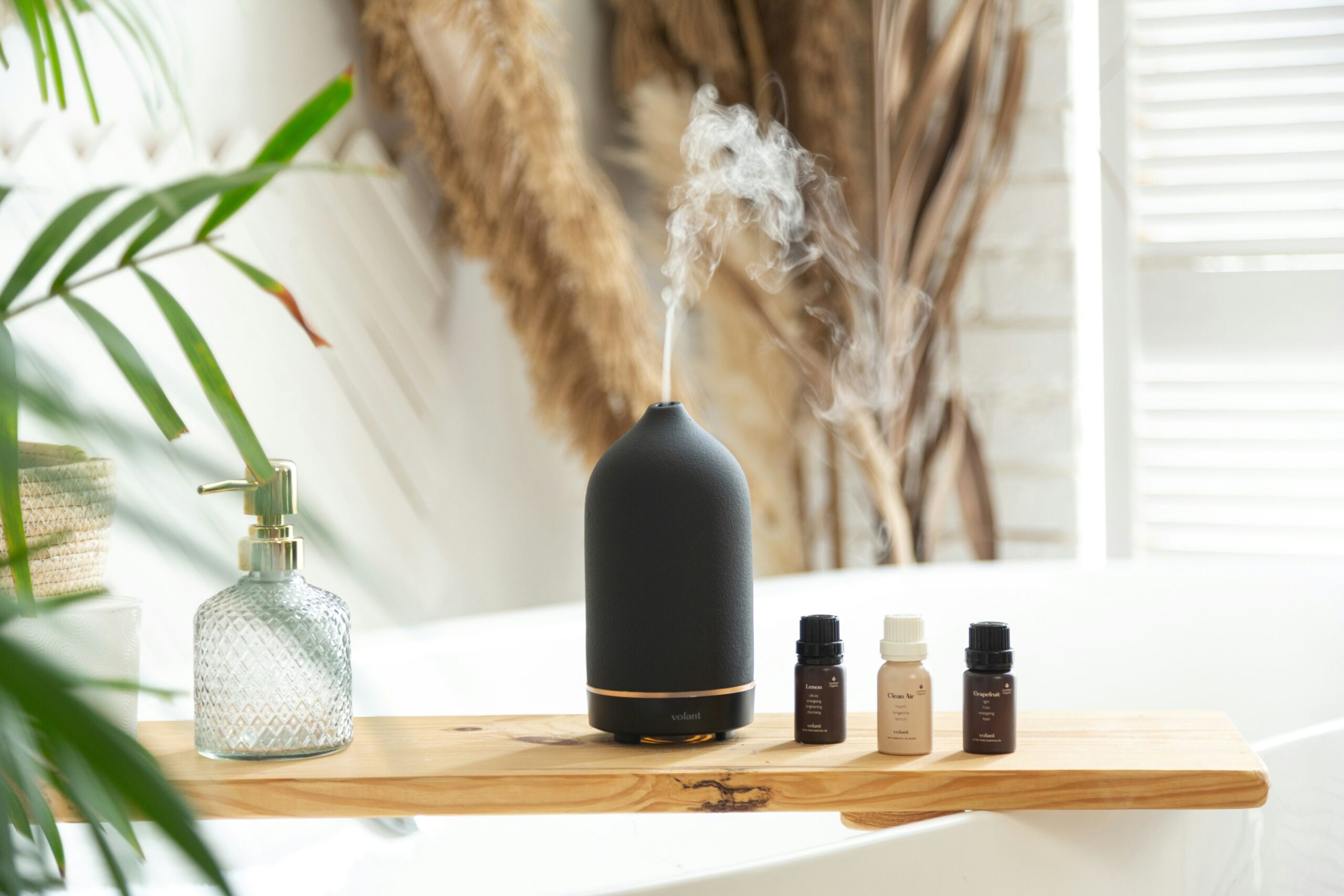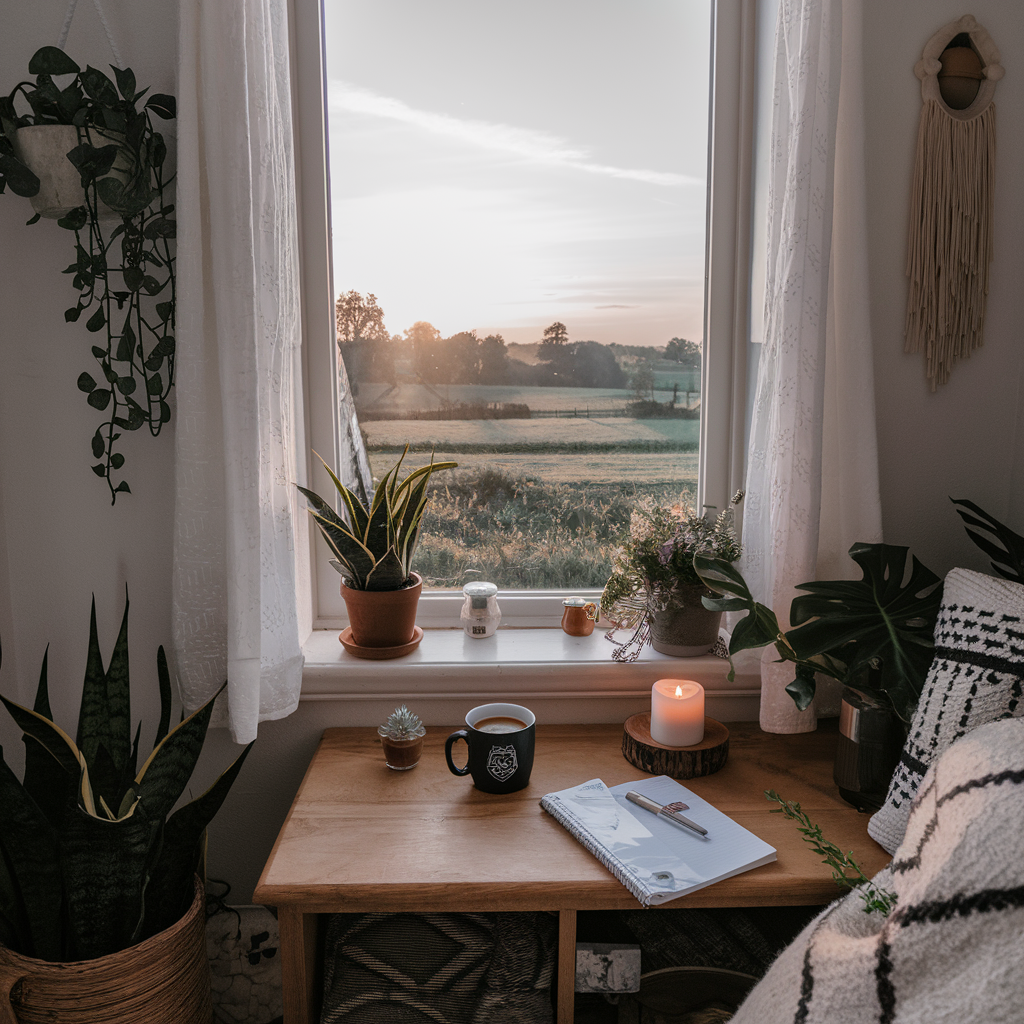Meditation for Introverts: A Calming Path to Recharge your Mind and Find Peace

Meditation for Introverts in a world that feels to much!!
Ever feel like the world is just too much?…. too noisy, too fast, too demanding? It’s like everyone else is thriving in the chaos while you’re left searching for a quiet corner to breathe. Introverts often crave solitude to recharge, a natural need rooted in how we’re wired.
That’s where meditation, mindfulness, and something iv recently discovered Non-Sleep Deep Rest (NSDR) come in. These practices offer us a lifeline, a way to step back from the noise, calm our minds, and find balance in a world that often feels overwhelming.
Meditation isn’t just sitting quietly in the lotus pose, it’s about finding a method that fits your rhythm. For introverts, that might mean exploring quiet mind meditation, dipping into NSDR for a power recharge, or weaving mindfulness into your daily life. These tools aren’t just calming…. they’re transformative.
In this guide, we’ll explore how meditation aligns seamlessly with the introvert’s natural rhythms, offering a way to recharge, refocus, and reconnect with yourself. Let’s dive into how these simple practices can help you find the peace and balance you’ve been craving.
Benefits of Meditation, Non Sleep Deep Rest (NSDR), and Mindfulness
Reduced Stress and Overwhelm
- Helps calm an overactive mind, especially after overstimulating social situations.
- Lowers cortisol levels, promoting a sense of peace and balance.
Enhanced Focus and Productivity
- Meditation and NSDR improve attention span and mental clarity, helping you tackle tasks with efficiency.
- Mindfulness keeps you present, reducing distractions and procrastination.
Improved Sleep Quality
- NSDR and mindfulness techniques can quiet racing thoughts, making it easier to fall asleep and stay asleep.
- Promotes restorative rest, leaving you energised and refreshed.

Emotional Regulation
Builds resilience, allowing you to handle challenges with greater ease.
Encourages self-awareness, helping you manage emotions like anxiety, frustration, or self-doubt.
Boosted Creativity and Problem-Solving Skills
- Creates mental space for new ideas and fresh perspectives to emerge.
- Supports deeper thinking, perfect for introverts who value reflection and creativity.
Greater Sense of Connection
- Helps you cultivate a deeper relationship with yourself and enhances your ability to be present with others.
- Reduces feelings of loneliness by fostering inner peace and self-acceptance.
Health Benefits
- Lowers blood pressure and reduces the risk of chronic illnesses associated with stress.
- Boosts your immune system by promoting relaxation and reducing inflammation.
Increased Self-Awareness and Personal Growth
- Encourages introspection, helping you understand your needs, values, and boundaries better.
- Supports long-term growth by aligning your actions with your deeper intentions.
Whether you choose NSDR or more traditional meditation techniques, both offer introverts the gift of intentional rest in a world that often demands too much. They aren’t just calming activities, they’re essential tools for navigating a noisy, overstimulating environment.
Why Meditation Fits Introverts Perfectly
A Haven for Introspection
- These practices align beautifully with your natural inclination to reflect and look inward. Meditation, NSDR (Non-Sleep Deep Rest), and mindfulness allow you to explore your thoughts in a calm, structured way.
A Deeply Restorative Escape
- Meditation acts as a mental retreat, offering a quiet, peaceful space to recharge, much like the solitude introverts naturally seek. NSDR, in particular, goes even further by deeply relaxing your mind and body in just a few minutes.
Essential for Balance and Clarity
- Taking time to meditate or practice mindfulness clears mental clutter and fosters clarity. It helps you process the overstimulation of social interactions or busy environments, restoring your sense of equilibrium.

Recharge Without Guilt
- These practices are intentional moments of stillness, meditation makes it easier for introverts to recharge without feeling like they’re shirking responsibilities or expectations.
Strengthens Self-Connection
- Mindfulness teaches you to tune into your own needs and emotions, helping you build a deeper understanding of yourself. This self-awareness enhances your ability to set boundaries and prioritize what truly matters as an introvert.
A Versatile Practice for Any Day
- Whether it’s a few minutes of mindful breathing, a guided visualization, or a quick NSDR session, these practices will fit seamlessly into your day, no matter how much time you have.
Transforms Solitude Into Growth
- Meditation and mindfulness elevate alone time into something productive and nurturing. It’s not just about “doing nothing” it’s about growing, calming, and restoring yourself.
Perfect for Recharging After Socializing
- After a day of interacting with others, meditation or NSDR helps you decompress and process the experience in a way that feels restorative, not exhausting.
“In a world that never stops, meditation teaches us the power of pausing.”
Meditation Techniques Tailored for Introverts
Quiet Mind Meditation for Peace
Quiet mind meditation is like slipping into a serene mental oasis, a perfect match for introverts seeking peace amidst the noise.
Here’s a simple guide to get started:
- Find Your Space: Choose a quiet spot where you feel safe and undisturbed. Think cozy corners, soft lighting, or even under a blanket if that’s your vibe.
- Set the Mood: Light a candle, play calming background music, or enjoy the silence. The idea is to make the space feel like a personal retreat.
- Breathe In, Let Go: Sit comfortably, close your eyes, and focus on your breath. Inhale deeply, exhale slowly, and let your mind settle.
- Gently Observe: As thoughts arise, don’t fight them. Acknowledge them and let them drift away like clouds passing in the sky.
- End with Gratitude: After 5-10 minutes, reflect on how your mind feels. End the session with a small note of gratitude for this peaceful moment.
Non Sleep Deep Rest (NSDR)
Understanding NSDR for Introverts
Now, let’s talk about Non-Sleep Deep Rest (NSDR) I recently discovered NSDR and its now my go to recharge strategy. Unlike traditional meditation, NSDR involves a deeply relaxing practice that helps the mind and body reset. Think of it as the mental equivalent of rebooting your computer, everything just runs smoother afterwards.
For introverts, NSDR is a game-changer. It’s like a power nap for the mind but without the need to actually sleep, 20 mins of NSDR is the equivalent to a two hour nap. By engaging in techniques like Yoga Nidra or guided deep relaxation, you’re giving your brain a chance to fully switch off, recover, and recharge.
How to Practice NSDR (Non-Sleep Deep Rest)
NSDR is like a restorative nap without the sleep, perfect for recharging your mental batteries. Here’s how to practice it:
- Find Comfort in Stillness: Choose a comfortable space, like your bed or a recliner. A dark or dimly lit room works best to minimize distractions.
- Use a Guide: Search for guided NSDR meditations on platforms like YouTube or meditation apps (e.g., Insight Timer or Calm). Look for sessions specifically designed for deep relaxation or body scan meditations
- Focus on Breathing: Close your eyes and focus on slow, steady breaths. Allow each exhale to melt tension away.
- Body Awareness: Pay attention to each part of your body, starting from your toes and working upwards. This promotes deep relaxation and a sense of grounding.
- Transition Gently: After the session, take your time to reawaken. Stretch, sip water, and enjoy the refreshed clarity in your mind.
Quiet tip: Use meditation to transition between activities: NSDR sessions can act as a reset, making it easier to switch gears between work, personal life, and social commitments.
Mindfulness for Introverts in Everyday Life
Mindfulness doesn’t have to be a grand event. For introverts, it can be seamlessly woven into daily routines:
- Mindful Walking: When taking a walk, notice the sound of your footsteps, the rustling leaves, or the feel of the breeze. Let these details anchor you to the present moment.
- Mindful Eating: Instead of rushing through meals, savour each bite. Notice the flavours, textures, and aromas, make it a mini meditation session!
- Mindful Chores: Turn mundane tasks into calming rituals. Focus on the rhythm of scrubbing dishes or folding laundry, letting your mind rest as your hands work.
- Micro-Meditations: Take 30 seconds to pause, breathe deeply, and reset during your day. These small moments can make a big difference in maintaining calmness.
“Mindfulness turns the ordinary into extraordinary—it’s the art of simply being.”
Overcoming Challenges:
Meditation for Busy or Anxious Minds.
“I Can’t Stop My Thoughts!”
For many introverts, the idea of a quiet mind feels as elusive as a unicorn. But here’s the truth: wandering thoughts during meditation are entirely normal. Your mind isn’t supposed to go blank, it’s meant to slow down, refocus, and reset.
Here’s how to work with your busy mind, not against it:
- Focus on Your Breath: Sit comfortably, close your eyes, and simply follow the rhythm of your breathing. Count each inhale and exhale up to 10, then start over.
- Use an Anchor Word or Phrase: Choose a calming word or phrase, like “peace” or “I am calm,” and repeat it silently in your mind.
- Be Kind to Yourself: When your thoughts drift, gently guide them back without frustration. Meditation is a practice, not a perfect performance.
Reassurance: Your mind is like a puppy… eager to wander. Meditation helps train your mind gently, one session at a time.
Fitting Meditation into a Busy Life
Think you’re too busy to meditate? The good news is, even tiny pockets of time can make a big impact. Start small and watch your practice grow naturally.
Simple ways to fit meditation into your day:
- Wake Up Mindfully: Spend five minutes breathing deeply before reaching for your phone in the morning.
- Commute Calm: If you use public transport, pop in your headphones and try a short guided meditation.
- Midday Reset: Take a quick five-minute mindfulness break at work, breathe, stretch, or just observe your surroundings.
- Evening Wind Down: Swap scrolling for a short NSDR session or mindful breathing before bed.
- Set Reminders: Use apps like Insight Timer, Calm, or Headspace to schedule meditations into your day, they even offer sessions as short as one minute!
Quiet Tip: Block out just five minutes in your calendar. Over time, you’ll look forward to these moments of peace.
How to Create a Meditation Sanctuary
Designing Your Peaceful Meditation Space
Creating a dedicated space for meditation is like giving your mind permission to relax. For introverts, this sanctuary becomes a haven, a little slice of solitude to retreat to whenever life feels overwhelming.
Here’s how to design your perfect meditation corner:
- Choose a Clutter-Free Spot: Whether it’s a cozy nook or a small corner of your room, aim for a space free from distractions and visual noise.
- Add Calming Colors: Soft, muted tones like blues, greens, or earthy neutrals help set a soothing mood.
- Incorporate Sensory Elements:
- Lighting: Use warm, dim lighting or candles for a serene atmosphere.
- Textures: Add a soft rug, cushion, or throw blanket for comfort.
- Scents: Use essential oils, incense, or a lightly scented candle, lavender and sandalwood are particularly calming.
- Keep It Simple: Less is more for introverts. A minimalist setup avoids overstimulation and keeps the focus on mindfulness.
Tools and Resources to Support Your Practice
Having the right tools can make your meditation practice more inviting and comfortable. Here are some essentials to consider:
- Meditation Cushion or Chair: Support your posture for longer, more comfortable sessions.
- Noise-Canceling Headphones: Block out external distractions and immerse yourself in your practice.
- Guided NSDR Audio Tracks: Use apps like Insight Timer, YouTube, or Calm to access professional NSDR sessions.
- Timer: A simple timer with a gentle chime helps you focus without worrying about the clock.
- Journaling Supplies: Keep a notebook handy to jot down reflections post-meditation, it’s a great way to track progress and insights.
Actionable Steps to Start Your Meditation Journey Today
Your 7-Day Meditation Challenge
If the idea of starting meditation feels overwhelming, this simple 7-day challenge is the perfect way to ease into the practice. Each day focuses on a manageable, beginner-friendly activity tailored to introverts.
- Day 1: Try quiet mind meditation for 5 minutes. Find a cozy, undisturbed spot and focus on your breath. If your thoughts wander, gently bring them back.
- Day 2: Explore a guided NSDR session. Choose a 10-minute track from apps like Insight Timer, Calm or Youtube.
- Day 3: Pair mindfulness with journaling. Reflect on how meditation has made you feel so far or write down one thing you’re grateful for.
- Day 4: Practice mindfulness during a simple activity, like eating or walking. Focus on the sensations, the taste, texture, or the sound of your footsteps.
- Day 5: Extend your quiet mind meditation to 10 minutes. Notice if it feels easier to sink into stillness.
- Day 6: Experiment with sensory aids, like calming scents or soft music, to enhance your meditation experience.
- Day 7: End the week with another NSDR body scan session, focusing on how your body feels as you relax deeply.
Quiet Tip: Repeat this challenge to make meditation a habit, gradually increasing your practice time.
Keeping Consistent Without Pressure
Consistency is key to reaping the benefits of meditation, but introverts often thrive in environments of flexibility and self-compassion. The goal isn’t perfection, it’s progress.
Tips to stay on track:
- Start Small: Even a minute of mindful breathing counts. Build gradually instead of aiming for long sessions immediately.
- Habit-Stacking: Anchor meditation to something you already do, like sipping your morning coffee or winding down at night.
- Be Kind to Yourself: If you miss a day, don’t stress. Just pick up where you left off.
- Track Progress: Use a journal or app to note how you feel after each session. Seeing the benefits in writing can be motivating.
- Switch It Up: Explore different styles, quiet mind meditation, mindfulness, or NSDR to keep it interesting.
“Meditation is a journey, not a destination. Every small step forward is a win.”
Final Thoughts
Meditation and NSDR aren’t just tools, they’re lifelines for introverts navigating a world that often feels too loud, too fast, and too overwhelming. They offer stress relief, mental clarity, and emotional balance, all while aligning beautifully with your natural rhythms and need for quiet reflection.
Whether it’s a few minutes of quiet mind meditation, weaving mindfulness into your daily routine, or indulging in a deeply restorative NSDR session, these practices can create a profound sense of calm and recharge. Over time, they’ll help you feel more balanced, focused, and at peace with your introverted nature.
Ready to recharge your mind? Start with a simple NSDR session tonight, your brain will thank you.
Remember: Small, consistent steps lead to meaningful change. You’ve got this.




